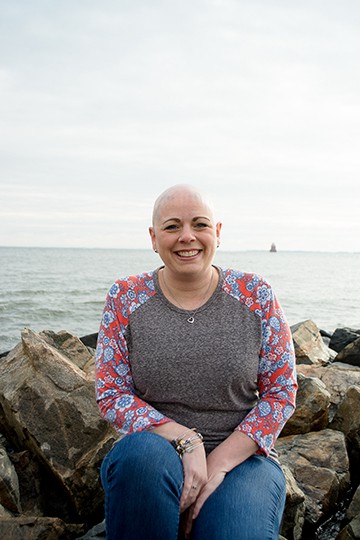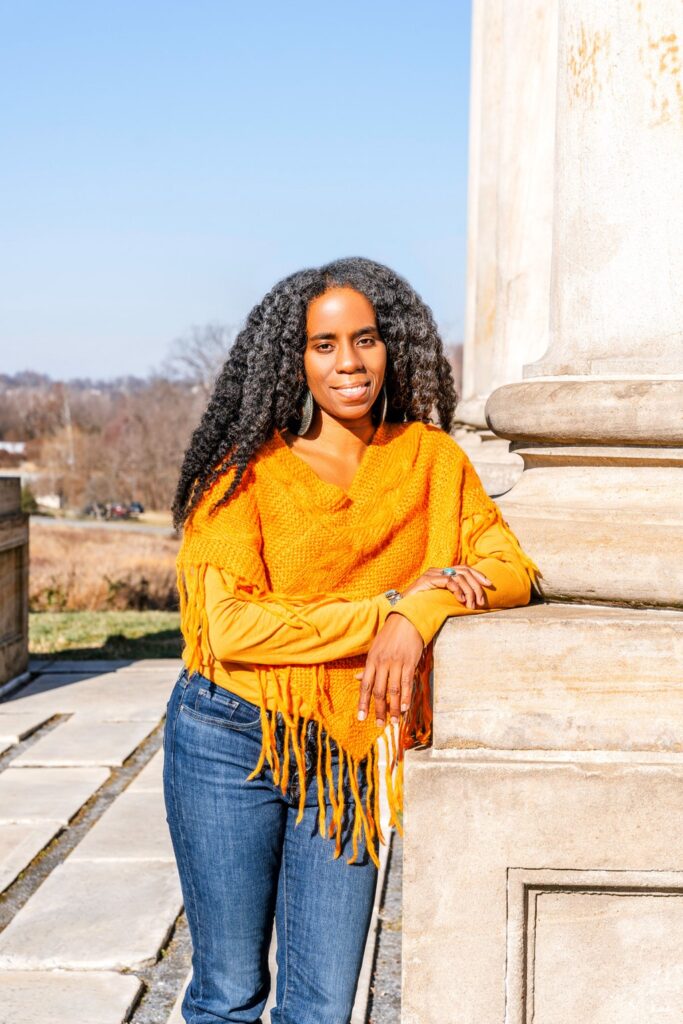Filmmakers Making A Social Impact: Why & How Filmmaker Alyscia Cunningham of ‘I Am More Than My Hair’ Is Helping To Change Our World
An Interview With Edward Sylvan
I was at my exhibit panel at Aging in America Conference in San Diego, California. My panel included portraits of the various portraits and quotes in Feminine Transitions along with quotes about embracing our natural beauty. A woman walked by with her daughter and stood there for several minutes looking at my panel presentation. After a moment she shed tears and thanked me for the work I had created. That was my first confirmation that I was making an impact.
As a part of our series about “Filmmakers Making A Social Impact,” I had the pleasure of interviewing Alyscia Cunningham.
Alyscia Cunningham is an entrepreneur, author, speaker, filmmaker, and photographer who has contributed to National Geographic, Discovery Channel, America Online and the Smithsonian Institution. She is also the Founder of Her House Media and the CEO of a Maryland Home Improvement company, Uprising Builders, LLC. Her work focuses on changing the dialogue around beauty standards for women.
Thank you so much for doing this interview with us! Before we dive in, our readers would love to get to know you a bit. Can you share your “backstory” that brought you to this career?
While in college, and unsure about my major, I took photography as an elective and found my passion. Photography had a different feel and I loved what it exposed to me (taking it for the first time). Realizing that my human subject, and even landscapes, reflected my emotions. No different than a painter using her/his canvas for their expression. It was a form of creative release.
It wasn’t long after graduating from school that the process of photography shifted to an over obsessive treatment of digital manipulation, particularly with the bodies of girls and women. I found myself completely out of love with the new trend. However, this experience led me to going against the grain and creating imagery that celebrates the raw beauty of women.
My art has evolved into filmmaking and directing in 2015, during the production of my photography book I AM MORE THAN MY HAIR. I interviewed women about their experience with alopecia and learned how to edit and market it on my own (due to cost). My mission is to continue the push the envelope and challenge the media’s standards of beauty using documentary-style photography and film as my medium.

Can you share the funniest or most interesting story that occurred to you in the course of your filmmaking career?
I learned a tough lesson in confirming the video and sound works. I traveled from MD to Delaware to meet a participant for filming. I checked my sound when I arrived home several hours later and realized the sound didn’t record. Not only was my mix off, I also forgot to put it on my camera. Lesson learned. Do a sound and video check before filming.
What are some of the most interesting or exciting projects you are working on now?
I’m working on my first exhibition of my book/film I Am More Than My Hair, which is accessible for visitors with hearing and vision loss. It’s a multi-sensory exhibit that includes 3d reliefs for touch and audio descriptions of the participants’ voices.
Which people in history inspire you the most? Why?
Harriet Tubman. I admire her stance on no one going back and no one getting left behind.
Let’s now shift to the main focus of our interview, how are you using your success to bring goodness to the world? Can you share with us the meaningful or exciting social impact causes you are working on right now?
I bring goodness by creating art that dispels the idea of a beauty standard using my film and photography as my platform. Along with the first exhibition of my most recent project, I Am More Than My Hair, I am in the production of making it accessible for visitors with hearing and vision loss, who are often left out of the art experience. I’m really excited about this production and the change it will create. My hope is that other artists will be inspired to make their art accessible as well.
Many of us have ideas, dreams, and passions, but never manifest it. But you did. Was there an “Aha Moment” that made you decide that you were actually going to step up and take action for this cause? What was that final trigger?
My “Aha Moment” was when a well-known photographer looked at one of my pregnancy portraits and said, “you should never take a picture of a pregnant woman and give it to her without photoshopping her stretch marks.” She went on to say “it’s ugly” I reference the stretch marks.
Although I politely disagreed, I left that portfolio review pissed. In my anger, I decided I was going to create a project that shows that we, as women, are naturally beautiful with all our marks, lines, and transitions. Hence I came up with Feminine Transitions, which includes portraits of girls and women that are free of Photoshop, makeup and accessories.
Can you tell us a story about a particular individual who was impacted or helped by your cause?
I was at my exhibit panel at Aging in America Conference in San Diego, California. My panel included portraits of the various portraits and quotes in Feminine Transitions along with quotes about embracing our natural beauty. A woman walked by with her daughter and stood there for several minutes looking at my panel presentation. After a moment she shed tears and thanked me for the work I had created. That was my first confirmation that I was making an impact.
Are there three things that individuals, society or the government can do to support you in this effort?
1. Support my crowdfunding campaign — https://ifundwomen.com/projects/i-am-more-my-hair-short-film
2. Make a tax-deductible donation towards my film https://www.wifv.org/events/#id=11036&cid=783&wid=401
3. Share my message on social media my sharing articles and experiences
What are your “5 things I wish someone told me when I first started” and why. Please share a story or example for each.
1. Don’t worry
2. Don’t stress
3. This will pass
4. Enjoy the journey
5. Have fun
If you could tell other young people one thing about why they should consider making a positive impact on our environment or society, like you, what would you tell them?
I heard the saying,” when you see something, say something.” I firmly believe this is the experience before the act of making a social impact, no matter how small. Doing something changes things, including minds. Changing Minds change behaviors.
We are very blessed that many other Social Impact Heroes read this column. Is there a person in the world, or in the US, whom you would like to collaborate with, and why? He or she might see this. 🙂
I would LOVE to collaborate with Director Jordan Peele. Aside from documentaries, horror is my other favorite genre. I want to work with him on a social impact horror film that has women if color in the leading roles.
Can you please give us your favorite “Life Lesson Quote”? Can you share how that was relevant to you in your life?
When you have an idea, create something, just do it. It’s simple yet relevant in all things I’ve done in my life. Everything I’ve accomplished, including my upcoming exhibition, was something I decided to do without putting too much thought in it. I just did.
How can our readers follow you online?
This was very meaningful, thank you so much! We wish you continued success!
About The Interviewer: Growing up in Canada, Edward Sylvan was an unlikely candidate to make a mark on the high-powered film industry based in Hollywood. But as CEO of Sycamore Entertainment Group Inc, (SEGI) Sylvan is among a select group of less than ten Black executives who have founded, own and control a publicly traded company. Now, deeply involved in the movie business, he is providing opportunities for people of color.
In 2020, he was appointed president of the Monaco International Film Festival, and was encouraged to take the festival in a new digital direction.
Raised in Toronto, he attended York University where he studied Economics and Political Science, then went to work in finance on Bay Street, (the city’s equivalent of Wall Street). After years of handling equities trading, film tax credits, options trading and mergers and acquisitions for the film, mining and technology industries, in 2008 he decided to reorient his career fully towards the entertainment business.
With the aim of helping Los Angeles filmmakers of color who were struggling to understand how to raise capital, Sylvan wanted to provide them with ways to finance their creative endeavors.
Filmmakers Making A Social Impact: Why & How Filmmaker Alyscia Cunningham of ‘I Am More Than My… was originally published in Authority Magazine on Medium, where people are continuing the conversation by highlighting and responding to this story.
